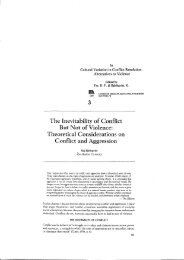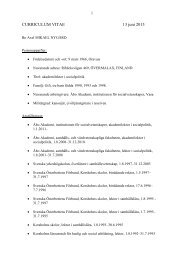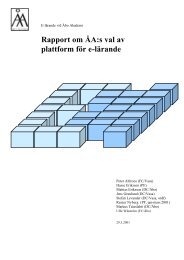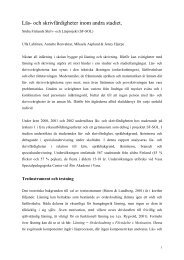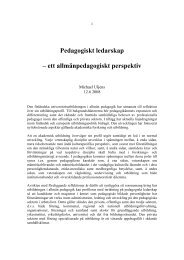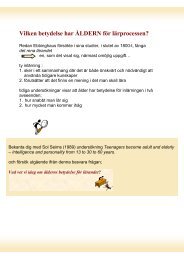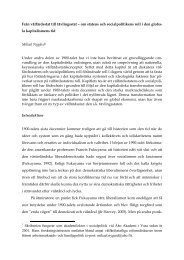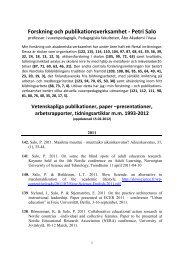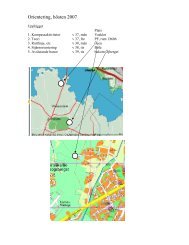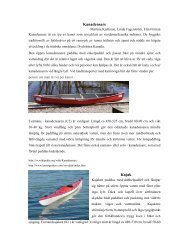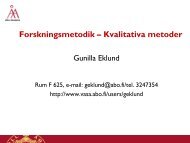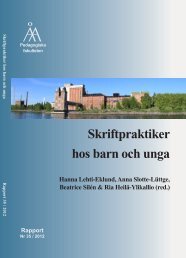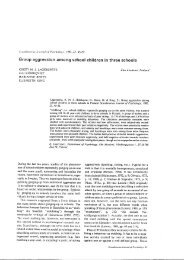Parties, Candidates and Citizens On-Line - Åbo Akademi
Parties, Candidates and Citizens On-Line - Åbo Akademi
Parties, Candidates and Citizens On-Line - Åbo Akademi
Create successful ePaper yourself
Turn your PDF publications into a flip-book with our unique Google optimized e-Paper software.
articles in the thesis. In general, with due caution to specific exceptions, it is not<br />
attributable to the smaller actors deeming the internet less important than other<br />
communication channels, nor having an otherwise more negative general opinion of the<br />
medium, that they lag behind their major counterparts in terms of website content <strong>and</strong><br />
sophistication. Their opinions, hopes <strong>and</strong> strategies for their websites are quite similar to<br />
those of the major actors.<br />
The third article also revealed some significant findings as to how the character of<br />
the Finnish parties was linked to what they did on their websites. The amount of<br />
information provided, the degree of participatory elements offered <strong>and</strong> the sophistication<br />
of the presentation of the party websites were all tested for linkage to the party-specific<br />
traits mentioned earlier. In general, with some exceptions, the results of the analysis<br />
revealed that among the internal conditions, only party size appeared linked to having<br />
websites with more information, more opportunities for user participation <strong>and</strong> more<br />
sophisticated presentation. This was indicated by a significant dividing line between<br />
parliamentary <strong>and</strong> non-parliamentary parties. In terms of internal, party-specific,<br />
conditions, size <strong>and</strong> resources appear to have an evident influence in shaping what<br />
Finnish political parties do on-line (cf. Nousiainen 1998, 72-73). This provides some<br />
support for the normalization theory (c.f. Margolis & Resnick 2000, 16; Margolis et al.<br />
2003, 57-58).<br />
The thesis’ findings regarding the role of both contextual <strong>and</strong> actor-specific<br />
conditions in shaping the on-line communication of political actors can now be<br />
summarized. All things considered, this thesis has served to demonstrate that on-line<br />
political activity by political parties, <strong>and</strong> most likely other political actors as well, is to<br />
some extent, influenced by both external- <strong>and</strong> internal conditions. These off-line<br />
conditions are relevant both in shaping the specific communication of political parties <strong>and</strong><br />
the structures of on-line electoral competition aggregated from this communication. <strong>On</strong>line<br />
politics does not appear to be an entirely distinct form of political activity: rather,<br />
both the surrounding society <strong>and</strong> the political actors employing the internet have<br />
important parts in influencing the politics of the internet (cf. Hill & Hughes 1998, 182;<br />
Margolis & Resnick 2000, 14).<br />
2.2. <strong>Citizens</strong> <strong>and</strong> the internet<br />
The discussion now turns to the second dimension, the on-line activity of citizens, which<br />
was discussed in this thesis’ theoretical introduction <strong>and</strong> included in the typology of four<br />
on-line political environments. Regarding this, the mobilization <strong>and</strong> reinforcement<br />
theories were presented in the introduction to the thesis. The citizens have been the focus<br />
of articles number two <strong>and</strong> number five in this thesis (Carlson & Str<strong>and</strong>berg 2005;<br />
175



